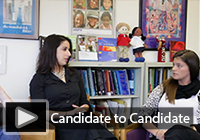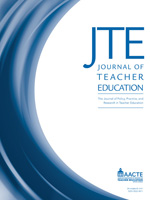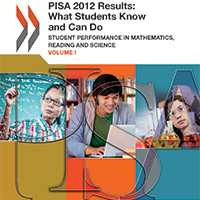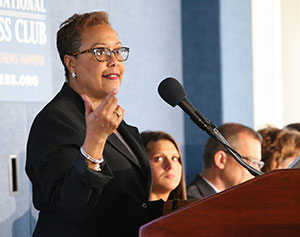08 Apr2014
By Kristin McCabe
Policy makers should allow more time for schools to implement the Common Core State Standards (CCSS), according to a statement released today by the Learning First Alliance.
The Alliance—a partnership of leading education organizations, including AACTE—wants policy makers to make sure instructional alignment and various supports are established before they apply high-stakes consequences to CCSS test results.
In support of this agenda, a new web site houses implementation success stories, such as podcasts from selected states, and a collection of other implementation resources.
01 Apr2014
By Elizabeth Ross
Starting last week, approximately 4 million students across 36 states and the District of Columbia began taking field tests for the Common Core State Standards (CCSS) assessments developed by the PARCC and Smarter Balanced consortia. The field tests are scheduled to run March 24 through June 6.
A few states are piloting the tests on a broader scale. Nearly all students in California, Connecticut, Idaho, Montana, and South Dakota will participate in the field tests.
24 Mar2014
By Valerie Fry
AACTE and the Stanford Center for Assessment, Learning, and Equity (SCALE) are pleased to announce the availability of new video interviews about edTPA, a nationally available teacher performance assessment created to ensure new teachers are effective from Day 1.
 The first set of video interviews comes from New York State. As of May 1, 2014, New York State will require teacher candidates to pass edTPA as a requirement for initial certification, and many institutions in that state have been piloting edTPA. For the videos, we set up a roundtable discussion with teacher candidates from some of these institutions to talk about their experiences using the assessment. The video series Candidate to Candidate: Reflections on Taking edTPA shows teacher candidates discussing the challenges of edTPA, sharing advice and major takeaways they learned from the program, and offering many other valuable insights on teaching and teacher preparation. Click here to see for yourself!
The first set of video interviews comes from New York State. As of May 1, 2014, New York State will require teacher candidates to pass edTPA as a requirement for initial certification, and many institutions in that state have been piloting edTPA. For the videos, we set up a roundtable discussion with teacher candidates from some of these institutions to talk about their experiences using the assessment. The video series Candidate to Candidate: Reflections on Taking edTPA shows teacher candidates discussing the challenges of edTPA, sharing advice and major takeaways they learned from the program, and offering many other valuable insights on teaching and teacher preparation. Click here to see for yourself!
18 Mar2014
By Omar Davis
Did you attend the edTPA-related sessions at AACTE’s Annual Meeting this year? If not, here’s a taste of what you missed! Click here to view a list of the descriptions and presenters for the various sessions that provided attendees the opportunity to converse with other users of edTPA.
A highlight of the conference was the edTPA breakfast hosted by SCALE, which drew more than 200 attendees. In her opening remarks, AACTE President/CEO Sharon P. Robinson championed edTPA, emphasizing that it was developed by and for the people in the room. She also encouraged audience members to advocate for edTPA in their communities. Afterward, Ray Pecheone, SCALE’s executive director, described in detail the developmental process of edTPA. He explained topics such as standard setting and state policy and announced that SCALE would conduct validity and consequential studies in the weeks ahead. Finally, attendees engaged in a question and answer session with Andrea Whittaker, SCALE’s director of teacher performance assessment, and other representatives.
10 Mar2014
By Sarah Pinsky
On February 27, the U.S. House subcommittee on elementary and secondary education and the subcommittee on higher education held a hearing titled “Exploring Efforts to Strengthen the Teaching Profession.”
Witnesses included Marcy Singer-Gabella, professor of the Practice of Education at Vanderbilt University (TN), along with two officials from state departments of education and the director of an alternative-route program.
09 Jan2014
By AACTE Committee on Global Diversity
The views expressed in this post do not necessarily reflect the views of AACTE.
The latest release of international test results has once again stirred the controversy of whether or not American students can successfully compete academically in a global context. Before we condemn our educational system, however, we must first understand exactly what the Program for International Student Assessment (PISA) reveals about student performance and whether a fair comparison can be made between American 15-year-olds and those in other countries.
10 Dec2013
By Kristin McCabe

The January/February 2014 issue of the Journal of Teacher Education (JTE) is now available online. See what Volume 65 Number 1 has to offer—without waiting for the mail delivery!
- In this month’s editorial, JTE‘s editors at Penn State University announce the 2014 Editorial Review Board and outline the highlights of this issue’s articles.
- “The Effects of Teacher Entry Portals on Student Achievement” classifies North Carolina public school teachers into 11 predominant “portals” of entry into the profession and estimates their effects on students’ test score gains. The gains are generally higher for students of teachers prepared through in-state, public undergraduate programs—but Teach for America corps members seem to be more effective in STEM subjects and at the secondary level.
03 Dec2013
By Kristin McCabe
 Today, the Organization for Economic Cooperation and Development (OECD) released results from the 2012 administration of the Program for International Student Assessment (PISA), a worldwide study of 15-year-old students’ performance on mathematics, science, and reading. American students’ performance remained largely unchanged from the previous PISA administration in 2009, although the U.S. ranking declined relative to other countries that improved over the past 3 years.
Today, the Organization for Economic Cooperation and Development (OECD) released results from the 2012 administration of the Program for International Student Assessment (PISA), a worldwide study of 15-year-old students’ performance on mathematics, science, and reading. American students’ performance remained largely unchanged from the previous PISA administration in 2009, although the U.S. ranking declined relative to other countries that improved over the past 3 years.
AACTE signed on to a statement of the Learning First Alliance about the results and also issued its own call for policy makers to look closely at the test’s lessons, along with the recommendations made by the OECD in its report Strong Performers and Successful Reformers in Education: Lessons From PISA 2012 for the United States as well as in the 2011 edition of the report, which focuses more on teacher preparation.
21 Nov2013
By Sharon Robinson and Fayneese Miller
Note: This op-ed was submitted to The New York Times but was not published.
A recent column by Bill Keller in The New York Times, “An Industry of Mediocrity,” highlighted a 2005 report by the well-respected Arthur Levine that concluded that the programs that prepare our nation’s educators “range from inadequate to appalling” and set the premise that the profession is a “contended cartel” of low-quality programs that should “feel threatened.” As leaders of AACTE, we view Mr. Keller’s column not as a threat but as an opportunity to do what we do best: educate.
14 Nov2013
By Sarah Pinsky and Valerie Fry

AACTE President Sharon P. Robinson speaks at the briefing
On November 8, AACTE marked the national launch of edTPA with a briefing in front of a standing-room-only audience at the National Press Club in Washington, DC. A report released at the briefing presents results of 2 years of field testing and recommends a passing score for edTPA, the first preservice performance-based assessment available to every educator preparation program across the country.
The briefing’s panelists—including a classroom teacher who completed edTPA in her preparation program, a teacher educator, state policy leaders, and edTPA partners—celebrated the new measure of teaching readiness as evidence that the teacher preparation profession is taking control of its future. Panelists said using edTPA as part of a multi-measure assessment system encourages continuous improvement by both candidates and programs, and it strengthens partnerships between the PK-12 community and teacher preparation programs. They also agreed that implementing the assessment with integrity will take time and the engagement of all stakeholders.
08 Nov2013
By Sharon Robinson
Today marks a proud accomplishment of the teacher preparation community and our partners as we celebrate the launch of the first nationally available, standards-based performance assessment for preservice teachers: edTPA.
edTPA was created for the profession by the profession and is already in use by nearly 500 teacher preparation providers in 32 states and the District of Columbia. With edTPA now fully operational, every preparation program in the country has access to a rigorous, reliable assessment that will give us confidence that aspiring teachers are ready to take charge of their classroom on Day One. This is truly a transformational moment in teacher preparation.
08 Nov2013
By Valerie Fry and Omar Davis
The annual edTPA Implementation Conference convened November 1-2 at the University of San Diego (CA) with the theme “Evidence of Learning and Practice: Teacher Performance Assessment by the Profession, for the Profession.” More than 400 higher education administrators, faculty, supervisors, and state education agency representatives were able to deepen their understanding of edTPA, ask important questions, and discuss strategies and best practices with their colleagues from across the country.
With edTPA now nationally available and being used by teacher preparation programs in 32 states plus the District of Columbia, this conference allowed teacher preparation professionals to share their trials and triumphs with edTPA implementation and plan for the future of their programs, institutions, and the teacher preparation field as a whole. The conference was cosponsored by the Stanford Center for Assessment, Learning, and Equity (SCALE) and AACTE and came just a week before a National Press Club briefing, to be held today in Washington, DC, to discuss the edTPA field test results and nationwide launch.
12 Sep2013
By Saroja Barnes
 edTPA™ passed a critical milestone this summer when the final assessments were submitted and scored as part of an ambitious two-year edTPA field-test period. Completion of this extensive field testing gives new momentum to edTPA, which is scheduled to be fully operational and available to all states and teacher candidates beginning September 18.
edTPA™ passed a critical milestone this summer when the final assessments were submitted and scored as part of an ambitious two-year edTPA field-test period. Completion of this extensive field testing gives new momentum to edTPA, which is scheduled to be fully operational and available to all states and teacher candidates beginning September 18.
During the 2011-12 and 2012-13 academic years, more than 12,000 teacher candidates in 26 states participated in the edTPA process. The candidates came from some 250 institutions. Minnesota, New York, Ohio, Tennessee and Washington were among the states with the highest number of teacher candidates participating in the field test.
03 Jun2013
By Sharon Robinson
Rigor has become a ubiquitous buzzword in education circles describing accountability measures for both educator and student performance. Under a scrutinizing lens, policy makers, researchers, and practitioners are examining whether standards for learning, methods of instruction, and assessment instruments are demanding enough to produce students who are college and career-ready by the end of high school.
In educator preparation, we think of program rigor in terms of productivity measures and indicators relative to the knowledge, skills, and dispositions acquired by our candidates. Our commitment to rigor is characterized by the pursuit of precise, accurate, exhaustive, and scientific measurement of teacher candidates’ ability to be effective educators.











 edTPA™ passed a critical milestone this summer when the final assessments were submitted and scored as part of an ambitious two-year edTPA field-test period. Completion of this extensive field testing gives new momentum to edTPA, which is scheduled to be fully operational and available to all states and teacher candidates beginning September 18.
edTPA™ passed a critical milestone this summer when the final assessments were submitted and scored as part of an ambitious two-year edTPA field-test period. Completion of this extensive field testing gives new momentum to edTPA, which is scheduled to be fully operational and available to all states and teacher candidates beginning September 18.